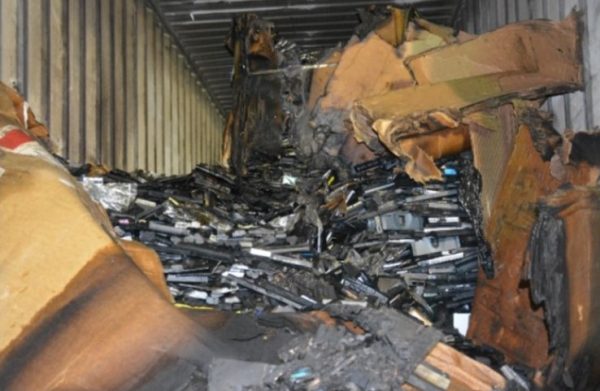International Marine Contractors Association (IMCA) provides lessons learned from an incident relating to a lithium battery fire in a freight container whilst en route to a port for trans-shipment to a vessel.
The incident
In August 2021 a container illegally loaded with discarded Lithium batteries caught fire while en route to the Port of Virginia in the United States. The container was being transported to port with the intent that it would be shipped to China aboard a container ship. The batteries caught fire on the highway resulting in loss of the cargo, and significant damage to the shipping container.
[smlsubform prepend=”GET THE SAFETY4SEA IN YOUR INBOX!” showname=false emailtxt=”” emailholder=”Enter your email address” showsubmit=true submittxt=”Submit” jsthanks=false thankyou=”Thank you for subscribing to our mailing list”]
Probable cause
#1 Upon initial investigation, the fire department determined that the heat produced from the fire burned hot enough to burn or melt a hole through the freight container’s structure. In addition, the bill of loading listed “computer parts,” not Lithium batteries. This is a situation that made responding to the fire more challenging and could have been potentially catastrophic had the container caught fire after being loaded aboard the container ship.
#2 Further investigation determined that the shipper had failed to properly placard, label, mark and package the lithium batteries, class 9, UN 3480 and 3481. The cause of fire was determined to be residual charge/full circuit, which led to a thermal increase.

Lessons learned
Lithium batteries are inherently hazardous and should be treated with the greatest respect. IMCA members have reported a number of incidents of injuries, fires and explosions caused by mishandling of Lithium batteries.
- Ensure damaged/defective Lithium batteries are appropriately and properly packaged for disposal and/or recycling according to applicable legislation;
- Be aware of how to address additional marking requirements for Lithium batteries being transported and Lithium batteries that are damaged or defective, or being disposed of or recycled;
- Ensure that Lithium batteries prepared for transportation are protected against short circuit;
- Ensure that Lithium batteries are stored appropriately.






























































